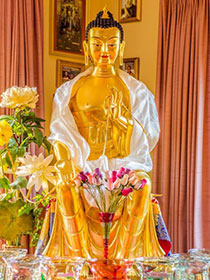- Home
- FPMT Homepage
Foundation for the Preservation of the Mahayana Tradition
The FPMT is an organization devoted to preserving and spreading Mahayana Buddhism worldwide by creating opportunities to listen, reflect, meditate, practice and actualize the unmistaken teachings of the Buddha and based on that experience spreading the Dharma to sentient beings. We provide integrated education through which people’s minds and hearts can be transformed into their highest potential for the benefit of others, inspired by an attitude of universal responsibility and service. We are committed to creating harmonious environments and helping all beings develop their full potential of infinite wisdom and compassion. Our organization is based on the Buddhist tradition of Lama Tsongkhapa of Tibet as taught to us by our founders Lama Thubten Yeshe and Lama Thubten Zopa Rinpoche.
- Willkommen
Die Stiftung zur Erhaltung der Mahayana Tradition (FPMT) ist eine Organisation, die sich weltweit für die Erhaltung und Verbreitung des Mahayana-Buddhismus einsetzt, indem sie Möglichkeiten schafft, den makellosen Lehren des Buddha zuzuhören, über sie zur reflektieren und zu meditieren und auf der Grundlage dieser Erfahrung das Dharma unter den Lebewesen zu verbreiten.
Wir bieten integrierte Schulungswege an, durch denen der Geist und das Herz der Menschen in ihr höchstes Potential verwandelt werden zum Wohl der anderen – inspiriert durch eine Haltung der universellen Verantwortung und dem Wunsch zu dienen. Wir haben uns verpflichtet, harmonische Umgebungen zu schaffen und allen Wesen zu helfen, ihr volles Potenzial unendlicher Weisheit und grenzenlosen Mitgefühls zu verwirklichen.
Unsere Organisation basiert auf der buddhistischen Tradition von Lama Tsongkhapa von Tibet, so wie sie uns von unseren Gründern Lama Thubten Yeshe und Lama Thubten Zopa Rinpoche gelehrt wird.
- Bienvenidos
La Fundación para la preservación de la tradición Mahayana (FPMT) es una organización que se dedica a preservar y difundir el budismo Mahayana en todo el mundo, creando oportunidades para escuchar, reflexionar, meditar, practicar y actualizar las enseñanzas inconfundibles de Buda y en base a esa experiencia difundir el Dharma a los seres.
Proporcionamos una educación integrada a través de la cual las mentes y los corazones de las personas se pueden transformar en su mayor potencial para el beneficio de los demás, inspirados por una actitud de responsabilidad y servicio universales. Estamos comprometidos a crear ambientes armoniosos y ayudar a todos los seres a desarrollar todo su potencial de infinita sabiduría y compasión.
Nuestra organización se basa en la tradición budista de Lama Tsongkhapa del Tíbet como nos lo enseñaron nuestros fundadores Lama Thubten Yeshe y Lama Zopa Rinpoche.
A continuación puede ver una lista de los centros y sus páginas web en su lengua preferida.
- Bienvenue
L’organisation de la FPMT a pour vocation la préservation et la diffusion du bouddhisme du mahayana dans le monde entier. Elle offre l’opportunité d’écouter, de réfléchir, de méditer, de pratiquer et de réaliser les enseignements excellents du Bouddha, pour ensuite transmettre le Dharma à tous les êtres. Nous proposons une formation intégrée grâce à laquelle le cœur et l’esprit de chacun peuvent accomplir leur potentiel le plus élevé pour le bien d’autrui, inspirés par le sens du service et une responsabilité universelle. Nous nous engageons à créer un environnement harmonieux et à aider tous les êtres à épanouir leur potentiel illimité de compassion et de sagesse. Notre organisation s’appuie sur la tradition guéloukpa de Lama Tsongkhapa du Tibet, telle qu’elle a été enseignée par nos fondateurs Lama Thoubtèn Yéshé et Lama Zopa Rinpoché.
Visitez le site de notre Editions Mahayana pour les traductions, conseils et nouvelles du Bureau international en français.
Voici une liste de centres et de leurs sites dans votre langue préférée
- Benvenuto
L’FPMT è un organizzazione il cui scopo è preservare e diffondere il Buddhismo Mahayana nel mondo, creando occasioni di ascolto, riflessione, meditazione e pratica dei perfetti insegnamenti del Buddha, al fine di attualizzare e diffondere il Dharma fra tutti gli esseri senzienti.
Offriamo un’educazione integrata, che può trasformare la mente e i cuori delle persone nel loro massimo potenziale, per il beneficio di tutti gli esseri, ispirati da un’attitudine di responsabilità universale e di servizio.
Il nostro obiettivo è quello di creare contesti armoniosi e aiutare tutti gli esseri a sviluppare in modo completo le proprie potenzialità di infinita saggezza e compassione.
La nostra organizzazione si basa sulla tradizione buddhista di Lama Tsongkhapa del Tibet, così come ci è stata insegnata dai nostri fondatori Lama Thubten Yeshe e Lama Zopa Rinpoche.
Di seguito potete trovare un elenco dei centri e dei loro siti nella lingua da voi prescelta.
- 欢迎 / 歡迎
简体中文
“护持大乘法脉基金会”( 英文简称:FPMT。全名:Foundation for the Preservation of the Mahayana Tradition) 是一个致力于护持和弘扬大乘佛法的国际佛教组织。我们提供听闻,思维,禅修,修行和实证佛陀无误教法的机会,以便让一切众生都能够享受佛法的指引和滋润。
我们全力创造和谐融洽的环境, 为人们提供解行并重的完整佛法教育,以便启发内在的环宇悲心及责任心,并开发内心所蕴藏的巨大潜能 — 无限的智慧与悲心 — 以便利益和服务一切有情。
FPMT的创办人是图腾耶喜喇嘛和喇嘛梭巴仁波切。我们所修习的是由两位上师所教导的,西藏喀巴大师的佛法传承。
繁體中文
護持大乘法脈基金會”( 英文簡稱:FPMT。全名:Found
ation for the Preservation of the Mahayana Tradition ) 是一個致力於護持和弘揚大乘佛法的國際佛教組織。我們提供聽聞, 思維,禪修,修行和實證佛陀無誤教法的機會,以便讓一切眾生都能 夠享受佛法的指引和滋潤。 我們全力創造和諧融洽的環境,
為人們提供解行並重的完整佛法教育,以便啟發內在的環宇悲心及責 任心,並開發內心所蘊藏的巨大潛能 — 無限的智慧與悲心 – – 以便利益和服務一切有情。 FPMT的創辦人是圖騰耶喜喇嘛和喇嘛梭巴仁波切。
我們所修習的是由兩位上師所教導的,西藏喀巴大師的佛法傳承。 察看道场信息:
- FPMT Homepage
- News/Media
-
- Study & Practice
-
-
- About FPMT Education Services
- Latest News
- Programs
- New to Buddhism?
- Buddhist Mind Science: Activating Your Potential
- Heart Advice for Death and Dying
- Discovering Buddhism
- Living in the Path
- Exploring Buddhism
- FPMT Basic Program
- FPMT Masters Program
- FPMT In-Depth Meditation Training
- Maitripa College
- Lotsawa Rinchen Zangpo Translator Program
- Universal Education for Compassion & Wisdom
- Online Learning Center
-
- Prayers & Practice Materials
- Overview of Prayers & Practices
- Full Catalogue of Prayers & Practice Materials
- Explore Popular Topics
- Benefiting Animals
- Chenrezig Resources
- Death & Dying Resources
- Lama Chopa (Guru Puja)
- Lama Zopa Rinpoche: Compendium of Precious Instructions
- Lama Zopa Rinpoche: Life Practice Advice
- Lama Zopa Rinpoche Practice Series
- Lamrim Resources
- Mantras
- Prayer Book Updates
- Purification Practices
- Sutras
- Thought Transformation (Lojong)
- Audio Materials
- Dharma Dates - Tibetan Calendar
- Translation Services
- Publishing Services
- Ways to Offer Support
- Prayers & Practice Materials
-
- Teachings and Advice
- Find Teachings and Advice
- Lama Zopa Rinpoche Advice Page
- Lama Zopa Rinpoche: Compendium of Precious Instructions
- Lama Zopa Rinpoche Video Teachings
- ༧སྐྱབས་རྗེ་བཟོད་པ་རིན་པོ་ཆེ་མཆོག་ནས་སྩལ་བའི་བཀའ་སློབ་བརྙན་འཕྲིན།
- Podcasts
- Lama Yeshe Wisdom Archive
- Buddhism FAQ
- Dharma for Young People
- Resources on Holy Objects
- Teachings and Advice
-
-
*If a menu item has a submenu clicking once will expand the menu clicking twice will open the page.
-
-
- Centers
-
- Teachers
-
- Projects
-
-
-
-
*If a menu item has a submenu clicking once will expand the menu clicking twice will open the page.
-
-
- FPMT
-
-
-
-
-
If we want to understand how we are ordinarily misled by our false projections and how we break free from their influence, it is helpful to think of the analogy of our dream experiences. When we wake up in the morning, where are all the people we were just dreaming about? Where did they come from? And where did they go? Are they real or not?
Share
Lama Thubten Yeshe
-
-
-
- Shop
-
-
-
The Foundation Store is FPMT’s online shop and features a vast selection of Buddhist study and practice materials written or recommended by our lineage gurus. These items include homestudy programs, prayers and practices in PDF or eBook format, materials for children, and other resources to support practitioners.
Items displayed in the shop are made available for Dharma practice and educational purposes, and never for the purpose of profiting from their sale. Please read FPMT Foundation Store Policy Regarding Dharma Items for more information.
-
-
19
Day 6 of CPMT 2014: Wisdom Culture
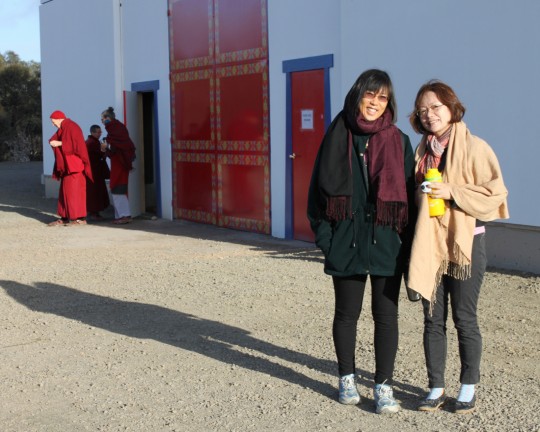
Selina Foong and Candy Tan, Great Stupa of Universal Compassion, Australia, September 2014. Photo by Laura Miller.
Day 6 of the CPMT 2014 meeting began with morning prayers beautifully led by Ven. Gyatso. After breakfast, Sarah Brooks led a morning motivation drawing from the Inner Job Description. At the end of the short reflection, she asked participants to set a goal for how they will benefit beings for the day and write it down so that at the end of the day they can check to see how they’ve done.
Helen Patrin led the morning session on “Keeping the FPMT Wisdom Culture Alive,” the last presentation for the meeting. Helen reminded us that Wisdom Culture is the “foundation of the Foundation of the Preservation of the Mahayana Tradition. … The wisdom and compassion that they have taught us over the years is infused into everything that we do.” Vens. Kunphen and Paloma Alba read out the nine key points of FPMT Wisdom Culture.
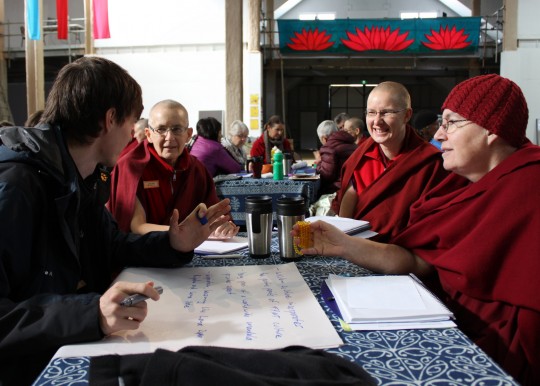
Robert Schwabe, Vens. Tenzin Tsapel, Tenzin Kunphen and Chantal Carrerot, CPMT 2014, Great Stupa of Universal Compassion, Australia, September 2014. Photo by Laura Miller.
There were three small group discussion periods about Wisdom Culture and supporting one’s respective center, project or service. Here are a few of the ideas shared with the large group about what Wisdom Culture is:
- The “family feeling” – the warm feeling of connection – that you experience at any center or project you visit
- A combination of the traditional teachings and an unconventional style, which gives a strong foundation and the freedom to explore in our local environments
- A rich oral tradition of sharing stories and senior students leading by their good example
- A safe path that is inclusive and open, depth and richness that is a living tradition
- Wisdom Culture is about harmony within ourselves and at centers
Dozens more ideas came from the small groups for supporting Wisdom Culture, including sharing videos of Rinpoche and Lama Yeshe. An example of this could be this video posted by the Lama Yeshe Wisdom Archive called “Bringing Dharma to the West – Lama Yeshe: How We Started Teaching Westerners”:
Just before lunch, François Lecointre gave an update on the Maitreya Loving Kindness Tour (formerly the Heart Shrine Relic Tour) complete with a photo presentation of the tour visiting different parts of the world. François shared Rinpoche’s advice on the purpose of the relic tour and explained how the tour, which is a collection of many holy relics from Buddhist masters including the Buddha himself, travels to many different kinds of places. In addition to Dharma centers, the relics visit hospices, prisons, museums and so forth. So far the holy relics have visited 68 countries.
Following a brief financial report on the meeting, all presenters from the previous days were invited to the front to recap their session and describe what comes next.
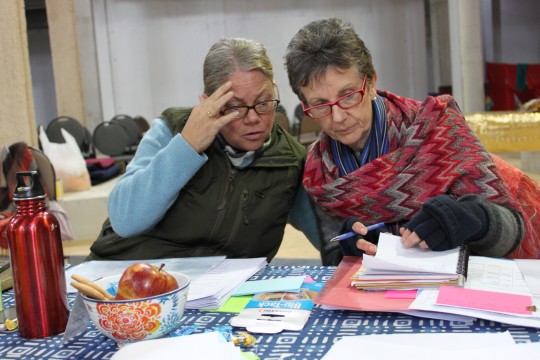
Claire Isitt and Sandra Stubbings going over the agenda on Day 6 of CPMT 2014, Great Stupa of Universal Compassion, Australia, September 18, 2014. Photo by Laura Miller.
“We’ve come from a humble beginning,” Ven. Roger said, referring to Lama Yeshe and Lama Zopa Rinpoche’s initial teachings while penniless monks, to the group of more than 100 sitting inside the Great Stupa. “We’ve achieved a lot and working together we can achieve a lot more.”
After a break for a group photo with Lama Zopa Rinpoche, there was a Lama Chöpa tsog with Rinpoche. Following that, Rinpoche gave the closing talk for the meeting, which focused on practicing bodhichitta. A video recording of Rinpoche’s talk is available on the CPMT Livestream page.
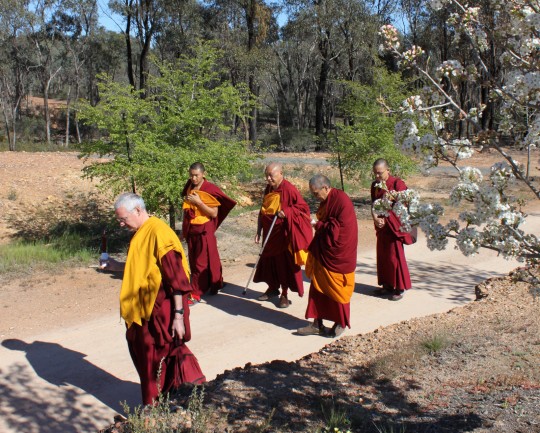
Lama Zopa Rinpoche walking to the Great Stupa of Universal Compassion with Khen Rinpoche Geshe Chonyi and Vens. Roger Kunsang, Sangpo and Sherab, Australia, September 19, 2014. Photo by Laura Miller.
“So if you really are practicing Dharmas, especially the Mahayana teachings … put all the blames to one, that is the ‘I,’” Rinpoche said. “There’s not someone else [to blame]. You are practicing Dharma, so blame the ‘I’, the self-cherishing thought. … Let go of the ‘I’, where all the suffering and obstacles come, let go of that and cherish others. [That is] where all the happiness comes from including enlightenment – all the success”.
After dinner, participants prepared for the next day’s long life puja for Lama Zopa Rinpoche, transforming the meeting space inside the Great Stupa into a proper gompa.
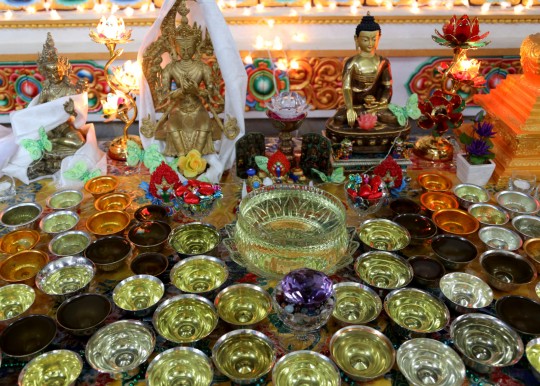
Offerings to the Guru Rinpoche statue in the Great Stupa of Universal Compassion, Australia, September 2014. Photo by Ven. Thubten Kunsang
You can find Mandala‘s coverage of CPMT 2014 on our blog.
Mandala brings you news of Lama Zopa Rinpoche and of activities, teachings and events from over 160 FPMT centers, projects and services around the globe. If you like what you read on Mandala, consider becoming a Friend of FPMT, which supports our work.
- Tagged: cpmt, cpmt 2014, lama zopa rinpoche
- 0
- Home
- News/Media
- Study & Practice
- About FPMT Education Services
- Latest News
- Programs
- New to Buddhism?
- Buddhist Mind Science: Activating Your Potential
- Heart Advice for Death and Dying
- Discovering Buddhism
- Living in the Path
- Exploring Buddhism
- FPMT Basic Program
- FPMT Masters Program
- FPMT In-Depth Meditation Training
- Maitripa College
- Lotsawa Rinchen Zangpo Translator Program
- Universal Education for Compassion & Wisdom
- Online Learning Center
- Prayers & Practice Materials
- Overview of Prayers & Practices
- Full Catalogue of Prayers & Practice Materials
- Explore Popular Topics
- Benefiting Animals
- Chenrezig Resources
- Death & Dying Resources
- Lama Chopa (Guru Puja)
- Lama Zopa Rinpoche: Compendium of Precious Instructions
- Lama Zopa Rinpoche: Life Practice Advice
- Lama Zopa Rinpoche Practice Series
- Lamrim Resources
- Mantras
- Prayer Book Updates
- Purification Practices
- Sutras
- Thought Transformation (Lojong)
- Audio Materials
- Dharma Dates – Tibetan Calendar
- Translation Services
- Publishing Services
- Teachings and Advice
- Find Teachings and Advice
- Lama Zopa Rinpoche Advice Page
- Lama Zopa Rinpoche: Compendium of Precious Instructions
- Lama Zopa Rinpoche Video Teachings
- ༧སྐྱབས་རྗེ་བཟོད་པ་རིན་པོ་ཆེ་མཆོག་ནས་སྩལ་བའི་བཀའ་སློབ་བརྙན་འཕྲིན།
- Podcasts
- Lama Yeshe Wisdom Archive
- Buddhism FAQ
- Dharma for Young People
- Resources on Holy Objects
- Ways to Offer Support
- Centers
- Affiliates Area
- Teachers
- Projects
- Charitable Projects
- Make a Donation
- Applying for Grants
- News about Projects
- Other Projects within FPMT
- Support International Office
- Projects Photo Galleries
- Give Where Most Needed
- FPMT
- Shop
Subscribe to FPMT News
Translate*
*powered by Google TranslateTranslation of pages on fpmt.org is performed by Google Translate, a third party service which FPMT has no control over. The service provides automated computer translations that are only an approximation of the websites' original content. The translations should not be considered exact and only used as a rough guide.If you cherish another person, another sentient being, there is enlightenment and you cause them to achieve every happiness. If you don’t cherish them, there is no enlightenment for you. Therefore, this person, this one sentient being, is the most precious one in one’s own life. Therefore, what is called I needs to be let go forever. And what is called other, even one sentient being, that is to be cherished forever.







